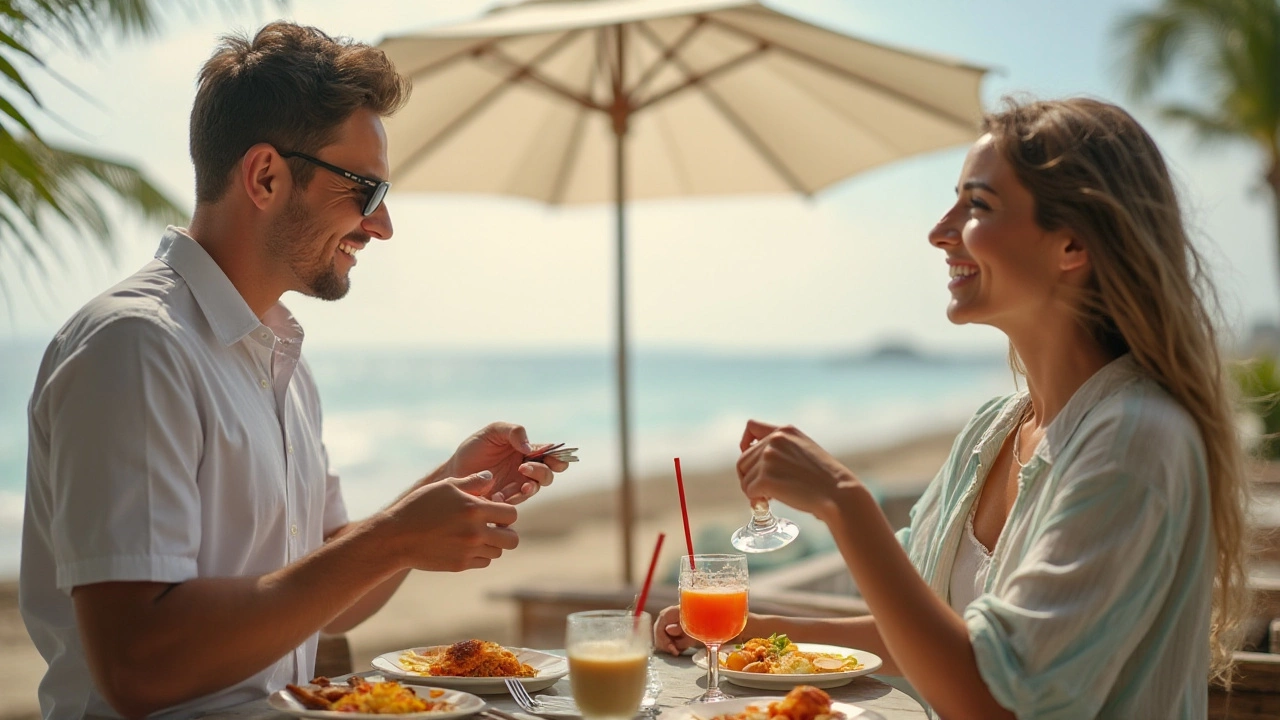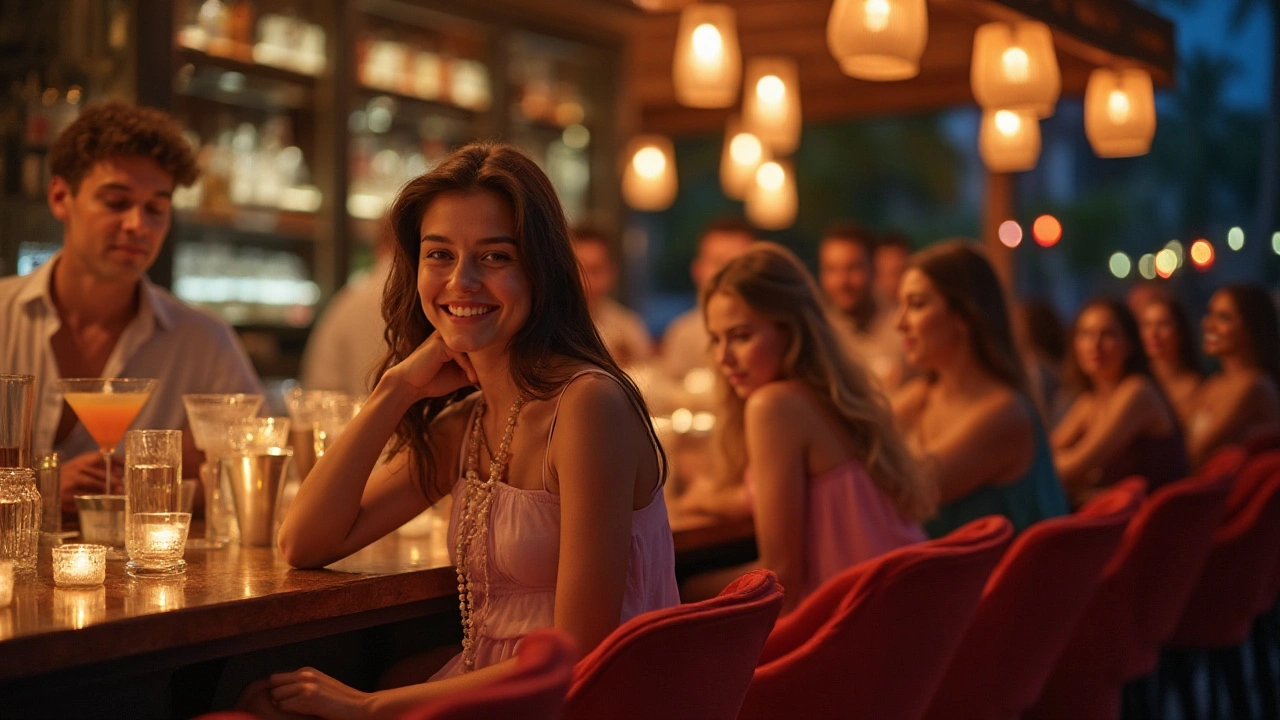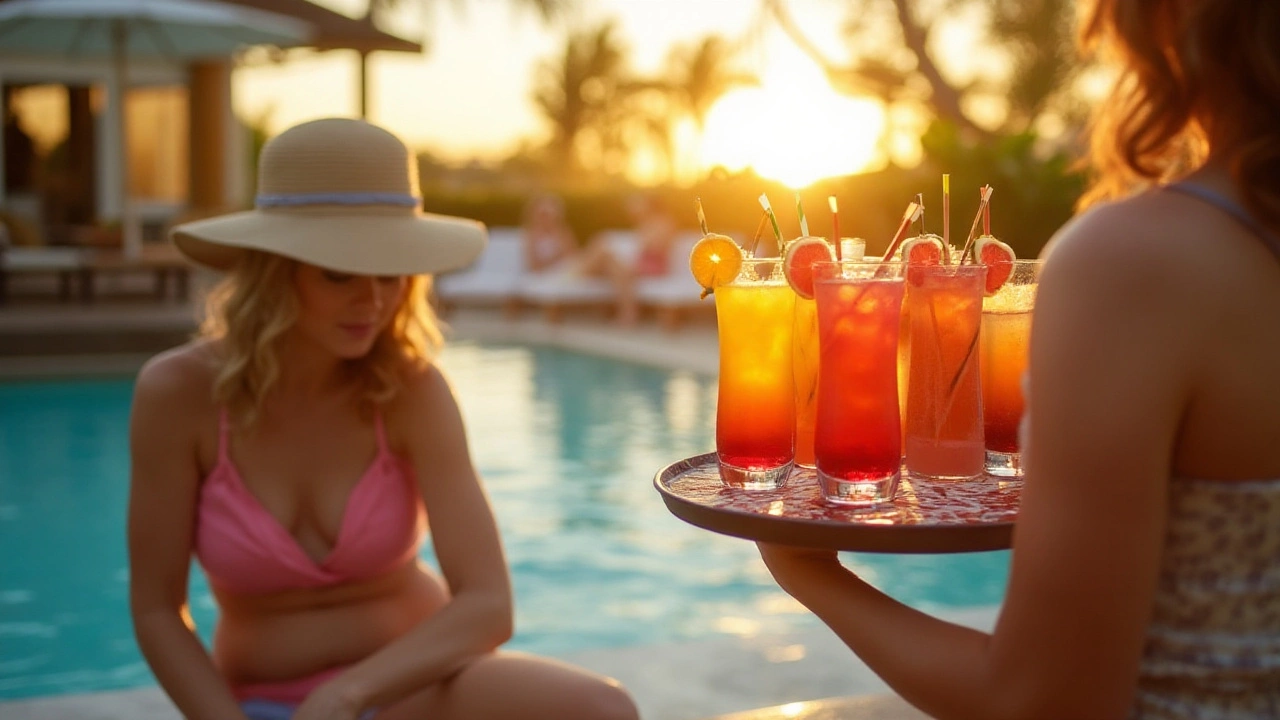Picture yourself lounging by a crystal-clear pool under the golden rays of a tropical sun. The waiter approaches with a cold drink that promises pure delight. For many of us, this dreamy scene often comes as part of an all-inclusive hotel package. But how inclusive are these packages when faced with stipulations like the '6 drinks a day' rule?
Whether you're a seasoned traveler or planning your first getaway, it's crucial to understand how these limits function and what they mean for your holiday happiness. Do they truly restrict your experience, or are they just a part of the fine print most of us skim past? In this exploration, we'll address the practicalities of all-inclusive drink rules, offering insights and useful tips to ensure your time away is filled with joyful memories, not unexpected hassles.
- Understanding All-Inclusive Packages
- The Origin of Drink Limits
- What Hotels Mean by 6 Drinks
- Impact on Guest Experience
- Maximizing Your Allowance
- Why Hotels Enforce Limits
Understanding All-Inclusive Packages
When we think of all-inclusive hotels, what often comes to mind is an enticing promise of boundless enjoyment, where every meal, drink, and leisure activity is taken care of. Yet, behind this carefree veneer lies a complex structure designed to balance customer satisfaction with profitability. Understanding how all-inclusive arrangements work not only helps in making smarter travel decisions but also enriches the vacation experience itself.
At its core, an all-inclusive package aims to bundle everything a guest might want or need into a single payment. The inclusivity aspect is not just about covering costs but creating an environment where guests need not worry about additional charges piling up. Meals, snacks, and beverages—both alcoholic and non-alcoholic—are typically included, along with various amenities such as pools, gyms, and even some excursions. However, the sharp reality often surfaces when you delve into the details laid out in the fine print, which guests might overlook in their excitement.
One way these packages maintain their allure is by managing customer expectations through certain limits and rules, such as drink restrictions. This approach helps hotels offer premium services without overextending their resources. For instance, the concept of '6 drinks a day' isn't plucked from thin air but instead, aligns with studies focused on average consumption and reasonable enjoyment levels without risking health or indulging in excess.
According to travel expert Mark Murphy, "The six-drink rule is more about helping guests pace themselves for an enjoyable experience throughout their stay without waking up the next morning with regrets."
Interestingly, only a small fraction of all-inclusive hotels worldwide impose such specific drink limitations. A deeper dive into their motivations reveals multiple facets, including health considerations, cost control, and maintaining a serene atmosphere in vibrant holiday destinations, like Mexico and the Caribbean. According to data gathered by the International Hotel and Restaurant Association, up to 25% of upscale destinations strategically manage alcohol to ensure their venues remain family-friendly and secure.
The essence of an all-inclusive stay—or for that matter, any pleasurable experience—relies on understanding the balance between abundance and limits. By being aware of what's included and where boundaries lie, travelers can more fully savor their holiday oasis without letting minor restrictions cloud their leisurely outlook. Ultimately, knowing these intricacies transforms a vacation from appealing on paper into a seamless, unforgettable reality, precisely what the package purports to offer.
The Origin of Drink Limits
To delve into the roots of drink limits within all-inclusive hotels, one must first understand the evolution of the all-inclusive model itself. This concept began gaining traction in the mid-20th century as resorts sought to provide hassle-free experiences where guests could pay one price for their entire stay, covering lodging, meals, and activities. Initially introduced by Club Med, the model experienced rapid adaptation worldwide, becoming synonymous with convenience and value. However, as the competitive hospitality market grew, maintaining profit margins while keeping an attractive price point became increasingly challenging for hoteliers.
This challenge brought about the necessity for regulations, particularly in areas where alcoholic beverages formed a significant component of the overall cost structure. Drinks, especially alcoholic ones, are not only financially significant but often heavily taxed and prone to abuse. Thus, setting drink limits has helped all-inclusive resorts balance guest satisfaction with business sustainability. Interestingly, implementing drink caps also allows hotels to moderate alcohol consumption responsibly, prioritizing guest safety and minimizing unruly behavior that could impact other guests' experiences.
Historically, some regions have imposed their own restrictions due to broader societal concerns. The Balearic Islands, for example, implemented policies that include drink limitations in popular tourist spots like Mallorca to combat excessive alcohol consumption and its associated social issues.
The Balearic local government has stressed, ‘the aim is to improve the quality of tourism’. By aligning hotel practices with governmental regulations, all-inclusive establishments protect their reputation and better integrate local customs and cultures into their business operations.Therefore, drink limits are not just about curbing expenses but also reflect a sensitivity towards sustainable tourism practices and cultural respect.
Adopting these rules has undoubtedly affected the marketing and operational strategies of many travel operators. While they offer attractive packages, these companies must now include transparent information regarding limitations tucked within the alluring promises of bottomless indulgence. This can come in the form of staggered drink offerings or alternative incentives, such as exclusive cocktail hours or upgraded packages that allow additional drink choices at a premium cost. The delicate balance between uninterrupted guest enjoyment and operational viability is akin to a dance that hotels must constantly refine to retain competitiveness in this vibrant market.
Interestingly, data collected by the hospitality industry shows a strategic implementation of drink limits can potentially enhance guest satisfaction. For instance, parents traveling with children might appreciate a controlled environment where there's less likelihood of intoxicated guests creating disturbances. An internal study among couples traveling without children noted their top concern when visiting family-oriented resorts was disturbance from overly inebriated singles or groups. Thus, while limits might initially seem restrictive, they can contribute positively to the overall holiday ambiance.

What Hotels Mean by 6 Drinks
The concept of limiting guests to 6 drinks a day in an all-inclusive setting may initially seem restrictive. However, understanding this common policy requires a closer examination. Hotels often adopt these rules to balance providing guests with an enjoyable experience, while also maintaining economic and social responsibility. The all-inclusive model typically covers food, lodging, and entertainment, and beverages also play a significant role. But why the limit? Hotels argue that capping drinks ensures an atmosphere of relaxation and safety for all guests. This approach helps discourage excessive drinking, which can lead to disturbances or even emergencies. By restricting quantities, hotels can craft a more controlled, pleasant environment where guests focus on leisure and socializing rather than imbibing excessively.
When examining how this policy plays out at various destinations, it becomes clear that not all resorts enforce it strictly. Some offer up to six signature cocktails included, potentially focusing on higher-quality options. Others suggest alternatives like unlimited soft drinks or specialty coffees as round-the-clock fillers. This method gives travelers a good balance and helps them enjoy a range of refreshments throughout the day. All-inclusive hotels implement these guidelines with the intention to diversify guests' experience as much as possible. One traveler commented on a popular review site,
“The six-drink rule actually improved my holiday. I had the best of both worlds—delicious cocktails and still got to try every flavored water and iced coffee on the menu!”
Interestingly, industry data from a 2023 survey reveals that while 25% of hotels maintain a set number of alcoholic drinks, over 50% continue with no formal limits, relying on other methods, like staff discretion, for administration. It's important to verify with your chosen hotel what their specific policies entail as they can change seasonally or year-to-year. Generally, though, most properties seek to keep things balanced by offering variations like add-on packages or unlimited non-alcoholic options, thus ensuring guests derive maximum pleasure from their stay without feeling thwarted by regulation. For travelers, the key takeaway is to not fixate on the number itself, but rather appreciate how the package harmonizes with their overall holiday intent. And remember, if one hotel doesn’t meet your expectations, there’s always another offering a fresh perspective just a booking away.
Impact on Guest Experience
When considering the allure of all-inclusive hotels, many vacationers imagine days of unbridled relaxation where drinks flow freely as part of the dreamy escape package. Yet, the reality of drink limits can often bring unsuspected surprises to those basking in vacation bliss. The '6 drinks a day' rule may seem restrictive at first glance, but understanding its implications paints a clearer picture of its impact on guest experience.
For some, these limits are a mere footnote; they find the allowance sufficient, given the range of non-alcoholic drinks and entertainment options. Guests like these often focus on the breadth of the package, including meals, activities, and excursions, seeing the drink limit as a small part of a larger appealing whole. However, others may find the limitation to be a dampener, particularly if they’re traveling with the aspirations of indulgent leisure.
As noted by travel expert Lisa Blake, 'All-inclusive does not mean unlimited. It's about managing expectations and finding value in the overall experience.'Visitors expecting an uncontested flow of cocktails might face disappointment, which can affect their perception of value for money and general satisfaction.
The effect of these drink policies also plays into the social aspects of vacationing. Consider groups of friends or families who travel with the intent of celebrating; moderation imposed by such rules can alter the dynamics of how they engage and revel in the vacation spirit. It’s a shared understanding amidst tourists that a capped experience might inadvertently curb the enthusiasm of some, leading to creative, albeit unauthorized ways to maximize their daily quota. Such maneuvering can sometimes lead to misunderstandings with hotel staff and potentially awkward situations for the guests.
Moreover, there's the matter of budget planning prior to embarking on a holiday. Often, travelers select all-inclusive hotels to keep a tight rein on spending, avoiding extra out-of-pocket expenses. The drink limit challenges this notion, as guests may find themselves purchasing additional drink vouchers for spontaneous indulgences. This shift inevitably affects guest psychology, as what was meant to be a budget-friendly escape turns into a series of additional costs. It's important to note here that many hotels utilize these limits as an effort to curb overconsumption, promoting not just a tranquil atmosphere, but a more responsible drinking culture.
In this sense, while the '6 drinks a day' might not sit well with a segment of travelers, it can instill mindfulness and encourage guests to savor the available amenities more deeply. They may find themselves engaging in other activities provided by the hotel which otherwise might have been overlooked.

Maximizing Your Allowance
When you're on vacation, the last thing you want is to feel restricted by limits that might cramp your style and spirit. Yet, with all-inclusive packages, the '6 drinks a day' policy often gives travelers pause. Understanding its reasoning can go a long way in helping you make the most of your leisure time. Many hotels introduce this rule to promote responsible drinking and ensure that guests enjoy a balanced experience. Given this, it becomes essential to strategize around these boundaries, transforming them into opportunities rather than stumbling blocks.
First, consider organizing the times you decide to drink. Spreading your beverages throughout the day ensures you're sipping on something pleasant from your morning mimosa to your evening piña colada. Drink packages often allow guests to access a variety of drinks; take advantage of this richness and explore the diverse libations offered, from cocktails to local craft beers. Also, getting to know the bartending staff creates an opportunity for personalized adjustments to your drinks, aligning them with your taste preferences and day-long plans.
Smart Choices and Pairings
The hallmark of a great trip often lies in the small, thoughtful choices we make. Opt for refreshing drinks like sangrias or spritzers that will quench your thirst while keeping you cool under the sun. Balancing these choices with what you eat might be your key takeaway to enhance not just how you drink, but also how you relish your meals. Wine pairings, for instance, can elevate your dining experience at resorts where gastronomic exploration abounds. Since many vacation planning considerations revolve around food and drink symbiosis, taking your time to savor each option instead of rushing through may reveal the wine to be as much an adventure as the coq au vin you pair it with.
"You can often tell a trip was worthwhile, not just by where you went, but by what you ate and drank while there," culinary travel expert Amy Porter once said, emphasizing the importance of slowing down to soak everything in.
Engaging With Exclusives
One often overlooked avenue is exploring exclusive drink choices available only with the all-inclusive hotels package. During your stay, keep an ear out for special tasting sessions that promote regional specialties, giving you a taste of local culture through your choice of beverage. These exclusives often do not count against your daily limit, offering a delightful bonus without biting into your already allotted drinks. Engaging in such tastings not only adds value to your experience but also enriches it with knowledge of the locale's endorsements and manufacturing heritage, adding layers to the stories you share back home.
Another strategy is to identify moments when it’s worth indulging in an extra drink or two and when it’s better to enjoy non-alcoholic options. Utilizing the wealth of themed nights or social hours that these resorts boast can lend context to your drinking choices, allowing you to increase kinship with fellow travelers and catering to a sense of communal joy. Contracting tips and anecdotes with fellow vacationers about stretching that allowance could forge not only friendships but also set a precedent of looking at rules through a lens of creativity and acceptance.
Why Hotels Enforce Limits
The world of all-inclusive hotels is expanding, shaping a vacation style that promises ease and luxury. Yet, within its paradise-like offerings, guests might wonder why such intoxicating limits like the '6 drinks a day' rule are imposed. Behind these limits lies a blend of financial prudence, customer experience management, and social responsibility. The primary reason is cost control. While it might sound cynical, hotels are businesses aiming to maintain a balance between offering competitive packages and ensuring profitability. Offering unlimited drinks 24/7 could transform these paradisiacal getaways into financial nightmares. Thus, by enforcing a drink limit, hotels effectively manage their budget and resources, ensuring they can continue providing guests with quality food, clean rooms, and ample amenities without spiraling into red ink.
Simultaneously, vacation planning isn't just about dollars and cents. Homes away from home, these resorts are responsible for crafting delightful and safe experiences. Unlimited alcohol consumption, while attractive at first glance, can lead to unruly behavior, accidents, and health concerns. The aim is to create environments where guests feel happy, relaxed, and secure. Such rules help in promoting responsible drinking and reducing incidents that could tarnish the reputation of the establishment and hinder guest enjoyment. As an industry expert once noted, "Limits exist not to restrict fun but to ensure safety and comfort for all."
- Travel & Leisure Magazine
Addressing Diverse Guest Needs
For families traveling with children, drink limits might serve as a reassurance that their environment prioritizes safety and good behavior. In contrast, young couples might appreciate the casual management that keeps resort grounds orderly and peaceful. Regardless of the demographic, managing consumption aligns with providing predictable and consistent service. This moderation adds a layer of reliability to the stay, fostering repeat visits and positive reviews. With the rise in global awareness around responsible travel, having structures that support sustainable and respectful tourism practices appeals to the conscious traveler.
Moreover, setting these boundaries isn't a universally strict regulation. Many resorts allow a mix of alcoholic and non-alcoholic options within the allowed drinks, catering to those who prefer to sip gradually throughout their vacation day. Seasoned travelers might even find ways to stretch their allowance creatively - think savoring a perfect cocktail while watching the sunset, followed by a refreshing fruit punch or delicious mocktail early in the day. Understanding such nuances enriches the guest experience, presenting drink limits as a thoughtfully curated part of the overall enjoyment.
